
Warren Buffett의 주식 선택이 예전 같지 않습니다.
버크셔 해서웨이 (BRK.B) 주식 포트폴리오는 지난 몇 년 동안 많은 격변을 겪었습니다. 예를 들어, Berkshire Hathaway의 투자 부문은 성장 플레이에 대한 취향을 얻었습니다. American Express 및 Coca-Cola와 같은 오래된 인기 상품은 여전히 주변에 있지만 Buffett &Co.는 Apple 및 Amazon.com과 같은 주식과 Snowflake 및 StoneCo와 같이 덜 알려진 회사에도 빛을 발했습니다.
그러나 Berkshire Hathaway 포트폴리오도 지난 1년 동안 여러 차례 이발을 거쳤습니다. 버핏은 COVID-19 대유행이 투자 환경을 크게 변화시키면서 수십 개의 주식을 줄이거나 줄였습니다. 그는 2020년 초에 여러 항공사를 소유했습니다. 이제 그는 아무것도 가지고 있지 않습니다. 은행은 2020년부터 버핏 주식 중 에이스였다. Berkshire는 1년 내내 그들을 연석으로 몰아넣었습니다.
음... 2021년인데 "워렌 아저씨"는 판매를 멈추지 않았습니다.
버핏은 올해 3분기에 다시 빗자루를 터뜨려 10개 포지션을 줄이거나 완전히 줄였습니다. 한편, 그는 2개의 포지션을 추가하고 2개의 새로운 지분을 시작함으로써 나가는 주식을 대체했습니다. 이는 11월 15일 증권 거래 위원회에 제출된 가장 최근의 Form 13F 규정 제출에 따른 것입니다.
전설적인 투자자 Warren Buffett이 시간과 관심을 기울일 가치가 있다고 생각하는 주식을 알고 싶다면 Berkshire Hathaway 주식 포트폴리오를 살펴보십시오. (항상 그렇듯이, 이 버핏 주식 중 일부는 실제로 포트폴리오 관리자인 Todd Combs와 Ted Weschler가 고른 것입니다.)
투자자들이 전체 Berkshire Hathaway 포트폴리오를 더 잘 이해할 수 있도록 각 보유 자산을 검토하면서 계속 읽으십시오.

유나이티드 소포 서비스 (UPS, $211.52) 아직 여기 있습니다.
세계 최대의 소포 배달 회사는 Warren Buffett의 주식 중 가장 작은 위치를 계속 유지하고 있습니다. 실에 걸려있지만 실제로는 15년이 넘는 기간 동안 그렇게 하고 있습니다.
아마도 워렌 삼촌이 주식을 버리지 않은 이유는 더 이상 그 주식을 알아채지 못하기 때문일 것입니다. 60,000주 미만의 주식에서 이것은 엉터리 포지션, 남은 음식, 홀수 제비입니다.
그것은 확실히 버핏이 시작한 것보다 적습니다. 버핏이 당시 약 1억 1,350만 달러 상당의 143만 주를 추가한 2006년 1분기에 UPS 주식이 버크셔 해서웨이 포트폴리오에 추가되었습니다. 주당 평균 가격은 $79.38입니다.
그러나 UPS는 Berkshire Hathaway 포트폴리오의 주요 부분으로 성장하지 않았으며, Buffett은 수년에 걸쳐 그가 언제든지 지분을 떠나더라도 놀라운 일이 아닌 위치로 입장을 축소했습니다. 그는 또한 스테이크에 대해 특징적으로 조용합니다. CNBC의 필수 불가결한 Warren Buffett 아카이브에는 United Parcel Service에 대한 언급이 없습니다.
UPS 지분은 2006년 3월 31일 이후 321%의 총 수익률(가격 + 배당금)을 제공하여 더 넓은 시장에서 398%에 비해 오랫동안 실망스러웠습니다. 코로나19가 저점을 찍은 이래로 적어도 실적이 뛰어났기 때문에 버핏 앤 컴퍼니에 약간의 위안이 됩니다.
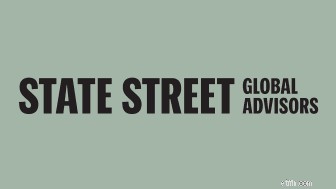
대부분의 투자자를 위한 Warren Buffett의 조언은 항상 간단했습니다. S&P 500 지수 펀드를 구입하고 그 기간 동안 약간의 돈을 국채에 투자하여 불황기에 잠을 잘 수 있도록 하십시오.
그러나 수년 동안 항상 "인덱싱은 했지만 나를 위한 것은 아닙니다." 시장에서 가장 유명한 주식 피커는 항상 하던 일을 계속했습니다. 주식을 고르고 단 한푼도 인덱싱하지 않는 것입니다.
버핏은 2019년 마지막 이닝에서 마침내 자신의 약을 복용했지만 2 S&P 500 추적 상장지수펀드(ETF).
그 중 첫 번째는 미국 최초의 ETF인 SPDR S&P 500 Trust ETF입니다. (스파이, $467.43). SPY는 S&P 500 지수의 500개 구성요소를 추적합니다. 연간 0.0945%의 매우 합리적인 비용으로 이를 수행하며, 이는 $10,000 투자에 연간 $9.45에 불과합니다. 많은 사람들이 매수 후 보유 투자로 사용하지만 거래량이 많기 때문에 트레이더에게도 인기 있는 도구입니다.
버핏이 마침내 그의 입이 있었던 곳에 그의 돈을 넣었다는 것은 대단한 일입니다. 하지만 솔직히 말해서 지수를 뛰어넘기 위해 적극적으로 노력하는 남자로서는 이상한 포지션이다. 결국, ETF는 지수를 추적할 뿐이며 비용이 포함되면 실제로 약간 언더퍼폼합니다.
누가 알아? 워렌 삼촌은 정말 오랜 시간 동안 집으로 돌아가고 싶었을 것입니다.

버핏은 인덱스 펀드에 대해 얼마나 진지한가요? 음, 그는 올해 연례 Berkshire Hathaway 회의에서 "나는 S&P 500 인덱스 펀드를 추천하며 오랫동안 보유하고 있습니다."라고 말하면서 이 주제를 다시 제기했습니다.
아마도 이것이 그가 SPY 외에 Vanguard S&P 500 ETF도 구입한 이유일 것입니다. (VOO, $429.77) 2019년.
대부분의 경우 VOO는 SPY와 거의 동일한 제품입니다. 두 펀드 모두 S&P 500의 구성요소를 추적합니다. 두 자금 모두 매우 유동적입니다. 가장 큰 차이점은 가격입니다. VOO는 SPY의 0.0945%에 비해 연간 0.03%의 더 낮은 수수료(Vanguard ETF의 일반적인)를 가지고 있습니다.
두 개의 추적 펀드에 대한 Berkshire의 투자를 합치면 이러한 투자가 아마도 대부분 상징적임을 깨닫기 시작합니다. 각 지분은 Berkshire Hathaway 지분의 약 100분의 1을 차지합니다.
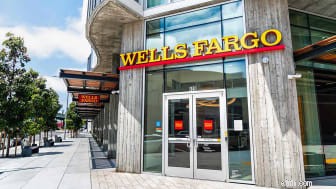
워렌 버핏이 해냈습니다.
웰스파고 (WFC, $51.08) 2001년부터 버크셔 포트폴리오에 포함된 이 종목은 한때 버핏 주식 중에서 가장 소중한 것으로 여겨졌습니다. 그러나 2016년부터 수많은 스캔들이 수면 위로 떠올랐을 때부터 오라클의 목을 졸라매는 무게로 바뀌었습니다. 은행은 수백만 개의 가짜 계좌를 개설하고 승인 없이 모기지를 수정했으며 필요하지 않은 자동차 보험에 대해 고객에게 청구했습니다.
정리 프로세스가 느리고 하나가 아닌 둘을 요구했습니다. 최고 경영자. 한편 WFC 주식은 꽤 오랫동안 동종 기업에 뒤처져 있었습니다.
그래서 버핏은 Wells Fargo가 포트폴리오의 지하 저장고로 강등되는 지점까지 처음에는 조금, 나중에는 많이 팔기 시작했습니다.
Berkshire는 2018년 초 이후 여러 분기에 걸쳐 WFC 주식을 매각했습니다. 그러나 몇 분기 동안 이러한 매각의 대부분은 은행에 대한 규정된 최대 소유 기준인 10% 미만으로 유지하기 위한 일상적인 입장을 정리한 것으로 보입니다.
그런 다음 쇠톱이 나타났습니다.
구원의 은혜가 있다면 몇 분기 동안 나머지를 그대로 두는 것입니다.
그럼에도 불구하고, 약 1년 이내에 Warren은 Wells Fargo의 최대 주주 중 한 명에서 소수의 파이를 소유하게 되었습니다.

다른 분기에 살아남은 또 다른 빈약한 위치는 Mondelez 입니다. (MDLZ, $62.85) Oreo 쿠키, Cadbury 초콜릿, Halls 기침약, Trident 껌 및 Triscuit 크래커를 포함하는 브랜드입니다.
2007년, 버핏은 당시 크래프트 푸드로 알려졌던 회사에 투자했습니다. 포장 식품 회사는 Kraft Foods Group이라는 북미 식료품 사업을 분사한 후 2012년 Mondelez로 이름을 변경했으며 KRFT라는 이름으로 거래되었습니다. Kraft Foods Group은 이후 2015년 버핏의 지원을 받아 H.J. Heinz와 합병하여 Kraft Heinz를 설립했습니다.
몇 년 후인 2017년에 버핏은 크래프트 하인즈가 세계적인 스낵 대기업을 인수할 것이라는 추측을 일축했습니다.
Berkshire Hathaway는 KHC에 상당한 지분을 보유하고 있습니다. MDLZ, 별로. S&P 글로벌 마켓 인텔리전스의 데이터에 따르면 버크셔는 몬델레즈의 상위 100대 주주도 아니고 MDLZ 주식의 0.04%에 불과하다. 그리고 Mondelez는 BRK.B의 주식 포트폴리오 전체 가치의 100분의 1에 불과한 버핏 주식 중 '노버거'입니다.
투자자들이 방어를 위해 필수 소비재 주식을 추가함에 따라 약세장에서 작은 위치를 잘 견뎠습니다. 그러나 MDLZ는 주식이 다시 제자리를 찾은 이후 더 겸손한 수익을 올렸습니다. 2020년 2월 19일 시장 최고점 이후 Mondelez 주가는 단 10% 상승한 반면 S&P 500은 총 수익률에서 42% 이상을 제공했습니다.
여기 볼 것이 없습니다.

Warren Buffett은 Berkshire Hathaway 포트폴리오 전체에서 볼 수 있는 Dow Jones 주식을 분명히 좋아합니다. 하지만 프록터 앤 갬블 (PG, $147.40)는 Berkshire Hathaway 투자로 곁길로 빠진 Dow 구성요소 중 하나입니다.
버핏은 지주 회사가 면도기 제조업체인 질레트를 2005년 인수하여 Tide 세제, Crest 치약 및 Pampers 기저귀 제조업체인 P&G를 소유하게 되었습니다. 당시 질레트의 대주주인 버핏은 이번 합병을 '꿈의 거래'라고 불렀다. Procter &Gamble은 BRK.B의 가장 큰 지분 중 하나가 되었습니다.
그 꿈은 오래가지 못했다. 대공황은 P&G와 같은 구식 필수 소비재 기업의 가격 결정력을 약화시켰습니다. 회사는 실적이 저조한 100개 브랜드를 철수하는 계획에 착수했습니다. 듀라셀 배터리 사업은 우연히 리스트에 올라 2014년 버크셔가 PG 주식과 교환해 이를 매입했다. 2년 후, 버핏은 P&G 지분의 99%를 깎았습니다. 그는 그 이후로 그 자리에 추가되지 않았습니다.
이 "버핏 주식"이 거의 단계적으로 사라졌지만, P&G는 약세장과 회복 초기에 도움이 되는 보유를 입증했습니다. 그러나 많은 방어주와 마찬가지로 PG 주식은 지난 몇 달 동안 크게 저조했습니다.

수년에 걸쳐 Berkshire는 전설적인 유료 TV 거물 John Malone에게 몇 가지 사실상의 내기를 걸었습니다. 버핏과 그의 포트폴리오 관리자가 처음에 호소한 내용은 이해하기 쉽습니다. 게임은 게임을 압니다.
Liberty 라틴 아메리카 클래스 A 주식 (LILA, $13.45) 및 Liberty 라틴 아메리카 클래스 C 주식 (LILAK, $13.27) 이러한 베팅 중 하나를 나타냅니다.
Liberty Latin America는 칠레, 푸에르토리코, 카리브해 및 기타 라틴 아메리카 지역에서 케이블, 광대역, 전화 및 무선 서비스를 제공합니다. Berkshire도 지분을 보유한 다국적 통신 회사인 Liberty Global(LBTYK)은 2015년에 라틴 아메리카 사업에 대한 추적 주식을 발행한 후 2018년에 해당 사업을 완전히 분사했습니다.
보다 최근에, 2020년 11월 Liberty Latin America는 푸에르토리코와 미국령 버진 아일랜드에 있는 AT&T(T)의 무선 및 유선 자산에 대한 거의 20억 달러 구매를 마감했습니다. 그리고 2021년 8월에는 코스타리카에 있는 Telefónica(TEF) 무선 사업 인수를 완료했습니다.
최근에 LILA와 LILAK에서 많은 활동이 없었습니다. 버핏은 2021년에 포지션을 완전히 변경하지 않았습니다.

동료 방어주인 P&G와 마찬가지로 Johnson &Johnson (JNJ, $163.52)는 버핏의 지지를 받지 못하고 토큰 보유에 불과합니다.
헤드라인을 장식한 페이스플랜트의 다양한 역사를 지닌 헬스케어 대기업을 비난하십시오. J&J는 2010년과 2011년에 제조상의 문제와 불법 마케팅 관행 혐의로 고투했습니다. 버핏은 2011년 기기 제조업체인 Synthes를 인수할 때 자사 주식을 너무 많이 사용한 것은 물론 이러한 실수에 대해 회사를 비판했습니다. Johnson &Johnson에 환멸을 느낀 버크셔는 2012년에 대부분의 지분을 매각했습니다.
JNJ에서 Berkshire의 위치는 2007년에 6,430만 주에 달했습니다. 오늘날 지주 회사의 지분은 약 100분의 1에 해당하는 327,100주(약 5,300만 달러)에 불과합니다.
시장이 COVID 저점에서 회복되면서 그 포지션은 크게 저조했습니다. JNJ 주식은 54%의 총 수익률을 제공했지만 S&P 500은 두 배 이상 증가했습니다.

Warren Buffett은 Floor &Decor Holdings의 지분을 시작했습니다. (FND, $130.00) 3분기에 주택 소매에 대한 그의 다른 투자와 거의 일치합니다. Floor &Decor는 주로 133개의 회사 운영 창고 매장 형식을 통해 단단한 바닥 바닥 및 관련 액세서리를 판매합니다.
버핏은 9월 30일 현재 거의 9,900만 달러에 달하는 회사의 816,000주 이상을 샀습니다. 버크셔 해서웨이의 총 포트폴리오 가치의 0.03%에 불과한 작은 포지션입니다. 하지만 여전히 버핏의 다른 자산 및 투자와 잘 맞습니다.
예를 들어, Berkshire Hathaway는 2019년 3분기부터 가정용품 소매업체인 RH(RH)(이전에는 Restoration Hardware로 알려짐)를 구축해 왔습니다. 그리고 그는 Berkshire Hathaway의 전액 출자 자회사인 Nebraska Furniture에 대한 사랑을 숨기지 않았습니다. 마트.
따라서 Floor &Decor는 다소 비스듬한 버핏 스타일의 각도이긴 하지만 주택 시장을 플레이하는 방법으로 보입니다.

시리우스 XM (SIRI, $6.63) 핵심 위성 라디오 사업과 2018년에 인수한 Pandora를 통해 약 1억 명의 청취자에게 도달하는 회사는 Malone과 관련된 또 다른 종목입니다.
Malone은 Sirius XM의 막대한 지분을 소유하고 있는 Liberty Media의 회장입니다.
Kiplinger가 언급했듯이 Malone의 진정한 비잔틴 기업 구조와 어떻게든 연결되어 있는 회사에 대한 Berkshire의 모든 투자는 Buffett의 포트폴리오 관리자 중 한 사람의 책임일 수 있습니다. Liberty Media는 그의 이전 Berkshire 시대에 Ted Weschler의 Peninsula Capital이 차지한 큰 위치였습니다.
그러나 이 직책에 대한 Berkshire의 선호도는 최근에 약해지고 있습니다.
버핏은 2016년 4분기에 SIRI의 주식을 처음 샀습니다. 버크셔는 2017년 3분기에 Sirius XM 포지션의 작은 부분(1%)을 해제했습니다. 몇 년 후인 2020년 1분기에 그는 390만 주(2%)를 줄였습니다. , 그런 다음 2020년 2분기에 62%인 8,200만 주 이상을 줄임으로써 도끼를 완전히 없앴습니다.
그는 몇 분기 동안 지분을 혼자 남겨두다가 2021년 1분기에 가위를 다시 꺼내 630만주(13% 추가)를 흘렸다. 그러나 그는 2021년 2분기와 3분기에도 안정적인 위치를 유지했습니다.
버핏은 1.1%의 지분으로 SIRI 주식의 네 번째로 큰 소유자입니다. 이는 Liberty Media의 지분 78%에 훨씬 못 미치는 금액입니다.
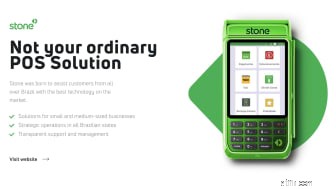
가격 폭락
브라질 금융 기술 회사 StoneCo (STNE, $31.31)는 기업이 신용 카드 및 직불 카드 결제를 용이하게 하는 소프트웨어 및 하드웨어를 제공합니다. 그리고 버크셔가 2018년 4분기에 그 자리에 들어간 이후 "가장 성장한" Warren Buffett 주식 중 하나였습니다.
적어도 최근까지는.
STNE 주식은 2020년에 2배 이상 상승하여 S&P 500의 18% 수익률을 쉽게 능가하여 2018년 말 이후 버핏의 이익을 355%로 끌어 올렸습니다. 그러나 StoneCo의 주가는 2021년 연초 대비 가치가 64%나 하락한 이후 꽁꽁 얼어붙었고 2019년 초 이후 현재 주가는 S&P 500보다 30포인트 이상 언더퍼폼하고 있습니다.
따라서 버핏이 2021년 1분기에 약간의 이익을 내고 약 350만 주(지분의 24%)를 매각한 것은 놀라운 일이 아닙니다.
STNE의 상대적으로 작은 위치와 핀테크 회사라는 사실을 감안할 때 이 위치가 버핏 중위인 Todd Combs에 의해 시작되었다는 사실을 알고 놀라지 않을 것입니다. 틀림없이 오마하의 신탁의 축복을 받은 것입니다.
그러나 StoneCo가 반드시 버핏의 주식 청사진에 있는 것은 아니지만 지불을 촉진하고 처리하는 회사에 대한 Berkshire Hathaway의 일반적인 낙관론과 잘 맞습니다. Warren Buffett은 Berkshire의 2018년 주주 총회에서 "지불은 전 세계적으로 엄청난 거래입니다."라고 말했습니다.
그리고 회사는 여전히 잡초처럼 성장하고 있습니다. 2020년 총 지불액(TPV)은 2,099억 브라질 헤알로 전년 대비 62.6% 증가했으며 수익은 28.9% 증가한 33억 브라질 헤알로 증가했습니다.

Berkshire Hathaway는 Geico, General Re, MLMIC Insurance 및 Berkshire Hathaway Specialty Insurance를 비롯한 핵심 사업에서 많은 보험 노출을 보유하고 있습니다. 그러나 업계는 주식 포트폴리오의 주요 요소가 된 적이 없습니다. 실제로 이 회사는 2020년 초에 TRV(Travelers) 지분에 남아 있던 지분을 매각했습니다.
따라서 BRK.B가 Marsh McLennan을 인수했을 뿐만 아니라 (MMC, $167.35) 2020년 말에 2021년 1분기에 그 위치를 확장했습니다.
버크셔는 2020년 4분기 동안 5억 달러에 약간 못 미치는 420만 주 포지션을 시작했습니다. 이는 버크셔 주식 총 가치의 0.2%에 불과한 주요 포지션은 아닙니다. 그러나 2021년 1분기에 100만 주 정도를 추가로 구매함으로써 지분은 불과 몇 달 만에 23% 증가했습니다.
그러나 버핏은 최근 마음을 바꾸어 2분기에 포지션을 20%, 2021년 3분기에 34%만 줄이면서 270만 주를 남겼습니다.
다양한 리스크, 전략, 컨설팅 서비스를 제공하는 MMC의 주식은 오랜 기간 후발주이다. 아마도 버핏은 미개척 가치를 보고 있을 것입니다. 회사는 또한 현재 1.3%의 배당금을 지급하고 있습니다.
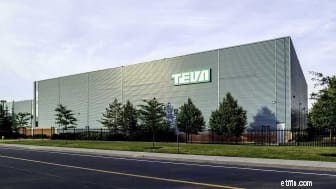
Berkshire Hathaway는 Teva Pharmaceutical 으로 이전했습니다. (TEVA, $9.44) 2017년 4분기 동안 회사는 당시 워렌 버핏의 고전 주식처럼 보였습니다.
이스라엘에 기반을 둔 제약 회사는 냉정하게 말해서 호의적이지 않았습니다. 부풀려진 대차대조표, 대량 정리해고, 임박한 의약품 특허 만료로 공매도자들은 곤욕을 치렀습니다.
버핏이 개입했을 때 테바 주가는 2015년 중반 고점에서 약 70% 하락했다. 그 후 Berkshire는 주가가 정말 저렴해 보이던 2018년 1분기에 Teva의 지분을 두 배로 늘렸습니다.
문제는 다음과 같습니다. 아직 저렴합니다.
TEVA 주식은 2018년 2분기 초 이후 가치의 거의 45%를 잃었습니다. 현재 이들은 미래 수익에 대한 분석가의 추정치의 4배 미만으로 거래되고 있으며, 이는 S&P 500 선도 P/E의 일부에 불과합니다.
그러나 버크셔는 약 1년 동안 그 자리를 그대로 유지했다. 가장 최근의 움직임은 2020년 1분기에 소폭 1% 감소한 것이었습니다. 그리고 버핏은 제약 이름의 3.9% 지분 덕분에 Teva의 4대 주주로 남아 있습니다.

일반적으로 건강 관리는 Berkshire Hathaway 자산의 많은 부분을 차지하지 않지만 지주 회사는 일반적으로 여러 부문 이름에서 지위를 유지합니다. Oracle of Omaha가 Royalty Pharma를 가져오기로 결정했기 때문에 BRK.B가 Merck와 Organon에서 철수한 후에도 여전히 그렇습니다. (RPRX, $41.70) 버핏 주식의 마구간으로.
즉, RPRX는 일반적인 제약 게임이 아닙니다.
로열티 파마는 이름에서 알 수 있듯 바이오 의약품 로열티를 획득하는 데 주력하고 있습니다. 약품을 연구하거나 개발하는 것이 아니라 그렇게 하는 회사에 자본을 제공하는 데 도움이 됩니다. 회사 설명:
"우리는 직접 및 간접적으로 바이오 제약 산업의 혁신에 자금을 지원합니다. 회사와 파트너 관계를 맺어 후기 단계의 임상 시험 및 신제품 출시에 대한 공동 자금을 미래 로열티와 교환할 때 직접적으로, 그리고 원래 혁신가로부터 기존 로열티를 획득할 때 간접적으로 말입니다. "
이 모델을 통해 RPRX는 AbbVie의 Imbruvica, Biogen(BIIB) Tysabri 및 Pfizer(PFE) Xtandi와 같은 블록버스터 약물을 얻었습니다.
버핏은 3분기 동안 RPRX의 지분을 확보하기 위해 4억 7,500만 달러를 지출했으며, 즉시 전체 주식의 3.1%를 보유한 상위 10대 주주가 되었습니다. 그러나 여전히 Berkshire Hathaway 포트폴리오 내에서 지분 자산의 0.2% 미만으로 상대적으로 빈약한 위치입니다.

지구 생활 (GL, $94.58)(2019년까지 Torchmark로 알려짐)은 Berkshire Hathaway 포트폴리오의 소규모 보험 관련 보유 자산 중 하나입니다.
생명 및 건강 보험 회사인 GL은 지루한 회사일지 모르지만 아주 조용히 아주 좋은 주식 선택이었습니다. Berkshire Hathaway는 2001년 초부터 Globe Life/Torchmark의 주식을 소유하고 있습니다. 그 당시 GL은 배당금을 포함하여 S&P 500의 504% 성과를 능가하는 566%의 총 수익을 창출했습니다.
BRK.B는 Globe Life의 발행주식 중 6.2%를 소유하고 있어 Vanguard 및 BlackRock(BLK)에 이어 회사의 3대 주주가 되었습니다.

Berkshire Hathaway는 2020년 3분기에 무선 통신 회사인 T-Mobile US의 소액 지분을 인수하여 통신 서비스 부문에 대한 노출을 확대했습니다. (TMUS, $117.77).
그런 다음 버핏은 2020년 4분기에 그 베팅을 말 그대로 두 배로 늘려 자신의 지분을 280만 주(117%) 더 늘렸습니다.
T-Mobile은 2020년 4월에 Sprint와 260억 달러의 합병을 완료한 이후로 확실히 훨씬 더 매력적인 투자입니다. 이 거래는 실제 총 가입자가 Verizon(VZ) 및 AT&T(T)와 동일한 구장 내에 있는 3위 무선 회사입니다.
그러나 주식은 2021년에 대략 12% 하락했으며 전체 시장의 총 수익률은 약 26%였습니다.
520만 주, 6억 7000만 달러의 지분은 현재 버크셔 해서웨이 포트폴리오 가치의 약 4분의 1에 해당합니다. 이는 회사 지분 0.4%에 해당하며, 버핏은 회사의 상위 20대 주주 중 한 명입니다.
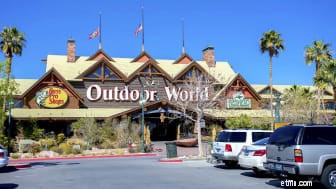
Store Capital 에서 Berkshire의 위치 2017년 여름에 입점한 (STOR, $34.24)는 이례적인 것이었다. 실제 자산을 소유하지 않고 부동산에 투자하는 방법인 부동산 투자 신탁(REITs)은 버핏 주식 중에서 결코 큰 비중을 차지하지 않았습니다.
Store는 체인 레스토랑, 슈퍼마켓, 약국 및 기타 소매, 서비스 및 유통 시설을 포함한 단일 임차인 부동산에 투자합니다. 즉, Store는 영구적인 쇠퇴로 생각되는 오프라인 소매에 대한 베팅입니다.
그러나 버핏은 가치를 관찰했으며 꽤 오랜 시간 동안 가치를 관찰했습니다. Store Capital의 CEO인 Christopher Volk는 CNBC와의 인터뷰에서 Buffett이 취임하기 전에 3년 동안 REIT를 공부했다고 말했습니다.
Oracle of Omaha는 회사의 2~3월 하락에서 비슷한 가치가 발생하는 것을 보았을 것입니다. 이 하락으로 STOR 주가는 고점에서 저점으로 약 65% 하락했습니다. 그가 580만 주 또는 추가로 31%를 구입하여 현재 가격에서 4.5%의 수익을 내는 2,440만 주를 확보했기 때문입니다.
버핏에게 희소식:STOR 주식은 3월 바닥 이후 124% 수익률을 기록하여 그 이후로 S&P 500의 115% 총 수익률을 기록했습니다.
BRK.B now owns 9.0% of shares outstanding, making it Store Capital's third-largest shareholder after Vanguard and BlackRock.

Warren Buffett has found a winner in RH (RH, $649.29), which many readers know as Restoration Hardware.
Berkshire, which already is positioned in home furnishings retail via its Nebraska Furniture Mart subsidiary, added more exposure to the space with his Q3 2019 entry into RH, then made a considerable addition to his stake to close out the year. The holding company has since topped up its position by 1% in Q1 2021, and 2% in Q2.
RH operates 106 retail and outlet stores across the U.S. and Canada. It also owns Waterworks, a high-end bath-and-kitchen retailer with 14 showrooms.
While brick-and-mortar retailers have struggled mightily over the past few years thanks in part to the rise of e-commerce, RH has found success catering to the upper crust. And that success continued throughout the COVID pandemic as Americans, forced to work from home, decided to spend on improving their environs.
RH shares have almost tripled since Jan. 1, 2020, up 198% versus a 49% total return for the broader market. Shares are killing it in 2021, too, up 42% to the S&P 500's 26%.
It's hard to tell whether this was an Oracle of Omaha buy, or a project of one of his lieutenants, Ted Weschler or Todd Combs. Buffett has been mostly mum on RH. Still, the stake fits broadly with the Oracle's worldview. Buffett stocks tend to be bets on America's growth, which is exactly what a bet on housing and housing-related industries is.
Buffett currently is the RH's third-largest investor by virtue of owning about 8.5% of all shares outstanding.

London-based Aon (AON, $300.44) offers a wide range of professional services, from insurance and reinsurance to pension administration and financial advising to health insurance. And it represented Buffett's lone new position in Q1 2021.
Like most insurance firms, you won't necessarily expect profits to grow in a perfectly straight line year after year. But revenues have improved without interruption over the past four years, and net income is up in three of the past five years.
That operational strength has led to superior returns against both the market and its peers. AON shares have provided a total return (price plus dividends) of 605% over the past decade, versus 354% for the S&P 500 and 302% for the SPDR S&P 500 Insurance ETF (KIE).
Berkshire hasn't exactly bet the farm on Aon. Even after adding 300,000 shares, or about 7%, the stake is still worth just $1.2 billion, or a little more than 0.4% of the equity portfolio's assets. Nonetheless, it's one of the few stocks Buffett &Co. have been bullish on amid a torrent of quarterly sales.
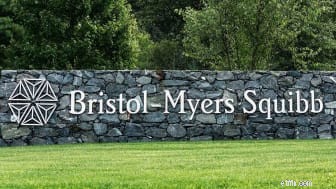
Among Warren Buffett stocks, banks are the most notable for getting the ax of late, but we should note that he's soured on several healthcare plays too.
Bristol Myers Squibb (BMY, $59.62) was one of several Big Pharma bets Warren Buffett during the third quarter of 2020. In the case of BMY, Berkshire took on almost 30 million shares worth $1.81 billion. Buffett grew even fonder of the company over the next few months. He tacked on another 3.4 million shares during Q4 2020, growing the position by 11%.
However, Buffett shed 2.3 million shares in the pharmaceutical giant during the first three months of 2021. In Q2, he dumped another 4.7 million shares, or 15%. And then in Q3, he trimmed yet another 16% or about 4.2 million shares.
BMY beefed up in a big way a year ago when it acquired pharmaceutical giant Celgene, and that likely was a big part of the initial attraction to this stock. The deal brought in a pair of blockbuster multiple myeloma treatments:Pomalyst and Revlimid, the latter of which also treats mantle cell lymphoma and myelodysplastic syndromes.
That's par for the course. A long track record of successful acquisitions has kept the pharma company's pipeline primed with big-name drugs over the years. Among the better-known names today are Coumadin, a blood thinner, and Glucophage, for type 2 diabetes.
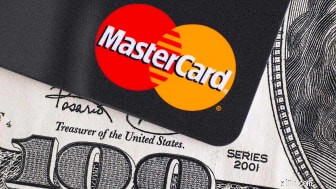
Berkshire Hathaway might own Mastercard (MA, $361.36), but Warren Buffett has given credit where credit is due:namely, to his portfolio managers Combs and Weschler.
Buffett's biggest regret is not pulling the trigger sooner.
"I could have bought them as well, and looking back, I should have," Buffett said about Visa and Mastercard in 2018, referring to his own investment in American Express.
Mastercard, which boasts 974 million cards in use across the world, is one of several payments processors that count themselves as Buffett stocks. That said, the position is a little lighter of late. Berkshire reduced its position by 6%, or 276,108 shares, during the third quarter, bringing MA's overall weight down to 0.5% of the equity portfolio.
Of course, Mastercard shares have returned some 1,430%, including dividends, since March 31, 2011 – several times better than the S&P 500 in that time – so it's hard to begrudge Warren Buffett a little profit-taking.
Besides:Since then, he has left well enough alone.

Biopharmaceutical firm AbbVie (ABBV, $116.84) is yet another of Berkshire's big pharma adds from Q3 2020, but it's also another healthcare stock that Buffett has been distancing himself from.
AbbVie is best known for blockbuster drugs such as Humira and Imbruvica, but analysts are also optimistic about the potential for Rinvoq and Skyrizi, which treat rheumatoid arthritis and plaque psoriasis.
And let's not forget that ABBV is a big hit with long-term dividend investors.
The pharmaceutical company is a Dividend Aristocrat, by virtue of having raised its annual dividend every year for half a century. Even better, its current yield is one of the highest in the S&P 500, and the company has raised the payout at an 18% average annual rate over the past five years. ABBV's dividend yield of 4.8% is several times better than the S&P 500 average of about 1.3%.
Most recently, however, Berkshire Hathaway has slimmed its position. The holding company sliced 29% off its AbbVie stake in Q3, unloading 6.1 million shares. That follows a reduction of 10%, or 2.3 million shares, in Q2, as well as a 10% cut to the position in Q1. AbbVie now accounts for 0.5% of Berkshire's equity portfolio, down from 0.8% at the end of Q1.
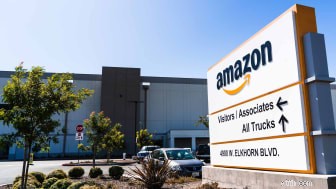
Amazon.com (AMZN, $3,545.68) has been a winner for Warren Buffett for most of the time since he first bit into the e-commerce giant in early 2019. However, like other AMZN shareholders, Berkshire is putting up with a rare bout of underperformance.
The holding company disclosed its 483,300-share position after the first quarter of 2019, then added another 54,000 shares the next quarter. AMZN shares are up 87% since the end of Q2 2019, versus 66% returns for the broader market.
That said, Amazon stock is up just 9% in 2021 versus 26% total returns for the S&P 500.
괜찮아. If Buffett really feels like it, he can deflect the blame to one of his lieutenants. Even before Berkshire Hathaway submitted its Q1 2019 regulatory filing with the Securities and Exchange Commission, Buffett told CNBC:"One of the fellows in the office that manage money ... bought some Amazon, so it will show up (when that file is submitted)."
That said, Buffett has long been an admirer of Amazon CEO Jeff Bezos, he admitted in an interview. He also copped to wishing he had bought the stock sooner.
"Yeah, I've been a fan, and I've been an idiot for not buying (AMZN shares)," Buffett told CNBC.
Berkshire holds an insignificant 0.1% of Amazon's shares outstanding to barely keep it within the top 100 shareholders. Interestingly, Buffett marginally reduced the position by 4,000 shares in Q1 2020, but he hasn't touched the stake since.

Warren Buffett made quite the splash in fall 2020 when he finally dove head-first into the Snowflake (SNOW, $393.70) initial public offering (IPO).
The chairman and CEO of Berkshire Hathaway, for the record, has never been a fan of IPOs. He's said so, on the record, and has notably turned up his nose at some of the most heavily hyped stock market debuts.
But that didn't stop him from being involved when Snowflake, a cloud infrastructure unicorn, hit the public markets with a blockbuster IPO.
Snowflake is a cloud-data warehousing company that plays in a roughly $55 billion annual market – a market that's expanding. The firm boasts nearly 5,000 customers, 116 of which are each responsible for generating around $1 million in revenues within a 12-month period.
Snowflake is generating a lot of hype because it offers a way for companies to run their software on various cloud platforms, be they provided by Amazon.com, Microsoft (MSFT) or Google parent Alphabet (GOOGL), to name just three. And the stock is heating up after a weak start to the year, outperforming the S&P 500 37%-26%.

Visa (V, $212.30) operates the world's largest payments network, and thus is well-positioned to benefit from the growth of cashless transactions and digital mobile payments. Like Mastercard, Visa was the idea of lieutenants Todd Combs and/or Ted Weschler (Buffett won't tell). Also like Mastercard, Buffett wishes Berkshire had bought more.
And like Mastercard, Buffett's Visa position got a little smaller in Q3 2021. The stake in V was nipped by 4%, or 425,000 shares.
Berkshire Hathaway first bought Visa in the third quarter of 2011, and it has proven to be a mammoth winner. Including dividends, Visa has delivered a whopping total return of 964%, well more than double the S&P 500's 407% total return in that time. Visa also is a dividend-growth machine, ramping up its payout by 127% over the past five years alone.
"If I had been as smart as Ted or Todd, I would have (bought Visa)," Buffett told shareholders at the 2018 annual meeting.
Visa accounts for a modest but not insignificant holding at 0.7% of Buffett's portfolio. Meanwhile, Berkshire's half-percent stake in Visa doesn't even put it among the top 25 investors.
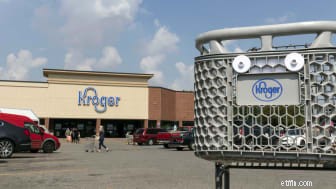
Kroger (KR, $42.66), is quickly becoming one of the most favored among Buffett's stocks, with the Oracle topping up his position by more than a fifth during the second quarter of 2021 after adding a huge chunk in Q1 too.
Berkshire Hathaway turned a few heads during the fourth quarter of 2019, when it initiated its 18.9 million-share position in Kroger. But given what was to come, it now looks like a savvy pick.
After all, the massive supermarket chain treated shareholders well during the worst of the pandemic and has continued to outperform in 2021. Indeed, shares are up by nearly 37% year-to-date with dividends included.
Kroger operates roughly 2,750 retail food stores operating under such banners as Dillons, Ralphs, Harris Teeter and its namesake brand, as well as 1,585 gas stations and even 170 jewelry stores under banners including Fred Meyer Jewelers and Littman Jewelers.
And Buffett is extremely interested in owning more and more of KR.
BRK.B added 10.7 million shares, or 21%, to his Kroger position in Q2. That followed the purchase of 17.5 million shares – a 52% increase in the position – during Q1.
With nearly 62 million shares total, Berkshire Hathaway is the third-largest owner of Kroger shares, with its 8.3% interest coming behind only BlackRock (10.2%) and Vanguard (9.4%).
It's only a middle-of-the-pack position at just 0.8% of Berkshire's equity assets. But the old-economy value play is a natural Buffett stock, right line line with the Oracle's traditional interests.

Berkshire bought Verisign (VRSN, $239.21) – an internet infrastructure service company that quite literally keeps the world connected online and acts as a domain registry for the .com, .net and other top-level domains – during a dip in the final quarter of 2012.
The company's dominance of the space exemplifies Buffett's love of deep moats, and the stake has paid off well. VRSN hasn't done well in the past year, up just 21% versus the S&P 500's 32%. But it has raced ahead by 516% since the start of 2013, which is well ahead of the S&P 500's 291% total return.
VRSN also is a teachable example of how stocks aren't good or bad in a bubble. One investor's brilliant purchase often is, depending on timing, another investor's biggest failure.
Stanley Druckenmiller, a famed former hedge fund manager, didn't have nearly as much luck with Verisign. Druckenmiller made a $200 million short on tech stocks in early 1999 while investing for George Soros' Quantum Fund, but lost $600 million in the trade. He then tried to win it back via a big $6 billion buy-in of tech stocks including Verisign ... but he lost $3 billion in six weeks as VRSN and several other recent purchases flopped, making it one of the "smart money's" worst stock calls of all time.
Berkshire Hathaway currently is the largest institutional investor in VRSN shares. It owns a little less than 13 million shares, giving it 11.4% control in the company.

Chevron (CVX, $116.82) is the only energy stock left in the Dow Jones Industrial Average after Exxon Mobil (XOM) was removed in 2020. It's also the sector's sole representative among Warren Buffett's stocks.
And Buffett can't seem to make up his mind about whether he likes or loathes CVX.
Berkshire Hathaway initiated a position of more than 48 million shares in the fourth quarter of 2020 valued at $4.1 billion. Although energy prices weren't expected to make huge moves 2021 after a considerable rebound in late 2020, the outlook for oil and gas was much improved and expected to get better as the global economy recovered.
Chevron specifically was well positioned, as it took advantage of the worst of the industry's woes in July 2020 by acquiring Noble Energy in a $5 billion all-stock transaction. The company's scale, asset quality and reserves make it one of the healthiest players in an industry where a lot of players are on injured reserve.
Also noteworthy is a 5%-plus yield at current prices. And that stands out all the more given that a slew of oil and gas firms had to slash or suspend their dividends in 2020. Chevron, meanwhile, has raised its quarterly payout for 34 consecutive years, including a 4% improvement announced in April to $1.34 per share.
And yet, Buffett reversed course in Q1 2021. In addition to booting Suncor Energy (SU) from the portfolio, Berkshire jettisoned a little more than half of its CVX position, unloading 24.8 million shares. He followed that up by dropping another 550,000 or so shares, or 2%, in Q2, to bring the position down to 23.1 million shares.
But Buffett flipped the script again in Q3, adding 28.7 million shares, or 24%, to his position.
The stake isn't nothing – CVX makes up nearly 1% of the Berkshire portfolio and is still a top-15 position. Meanwhile, at 1.5% of Chevron shares, Berkshire is the firm's sixth-largest investor.
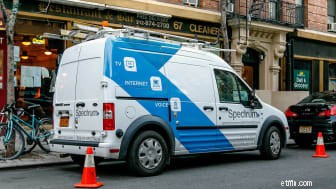
Charter Communications (CHTR, $692.91) markets cable TV, internet, telephone and other services under the Spectrum brand, which is America's second-largest cable operator behind Comcast (CMCSA). It greatly expanded its reach in 2016 when it acquired Time Warner Cable and sister company Bright House Networks.
And it's also yet another Buffett stock with a John Malone connection – albeit a small one now. Malone served on the telecom and media company's board of directors from 2013 until 2018, when he stepped down to concentrate his focus on a smaller group of companies. (He does remain a director emeritus, however.)
Buffett entered CHTR in the second quarter of 2014, but he has seemingly lost his love for the telecom company in recent years. His position has been trimmed down from 9.4 million shares in early 2017 to just 4.2 million shares as of Berkshire's most recent 13F, including a million-share reduction (or 19%) in Q3 2021.
Charter remains a decent position in the Berkshire Hathaway portfolio, at a little more than 1% of its equity assets.

Berkshire technically has three different investments in satellite-radio leader Sirius XM Holdings (SIRI). Not only does it hold a slug of SIRI shares – it also has positions via two different tracking stocks:Liberty Sirius XM Group Series A (LSXMA, $55.74) and Liberty Sirius XM Group Series C (LSXMK) tracking stock.
Liberty Media has for years held a large stake in Sirius XM Holdings. But in 2015, the company actually recapitalized, offering (among other things) several tracking stocks that allowed investors to participate in the performance of Liberty's Sirius XM investment directly rather than get it piecemeal through Liberty Media itself.
While that stake has largely been left alone over the past few quarters, Buffett decided to amplify his Sirius bet by tacking on another 20 million or so shares of LSXMA, or a 35% bump from the second quarter of 2021.
Berkshire is the largest institutional shareholder in each of the tracking stocks, holding 15.3% of Liberty Sirius XM's C shares and 19.2% of the A shares.
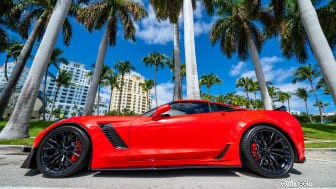
Warren Buffett first took a stake in General Motors (GM, $62.97) in early 2012. And over the past few years, he became even more bullish on the world's fourth-largest auto manufacturer by production, upping Berkshire Hathaway's holdings in 2018, 2019 and as recently as Q3 2020.
But lately, Buffett has started to distance himself.
Berkshire reduced its ownership in the car company by another 10% in Q2, or 7 million shares. That follows cuts of 5.5 million shares (7.6%) in the first three months of 2021, and 7.5 million shares (9.0%) during the final quarter of 2020.
General Motors has always looked like a classic Buffett value bet. After all, there are fewer American brands more iconic than GM. He also has sung the praises of CEO Mary Barra on several occasions. And the stock perennially trades at crazy-cheap multiples of expected earnings.
But with shares up nearly 260% since the COVID bottom, maybe it was time to take a little more off the top of a profitable investment – even if analysts still like the valuation and potential for resumption of income.
"On valuation, GM shares appear favorably valued based on most standard valuation metrics," writes Argus Research analyst Bill Selesky, who rates GM at Buy. "We also expect the company to soon reinstate its dividend."
Then there's the matter of allocation. Thanks to GM stock’s strong price performance, it still accounts for almost 1.1% of Berkshire Hathaway's total equity portfolio, down from 1.4% before Buffett's most recent trimming.
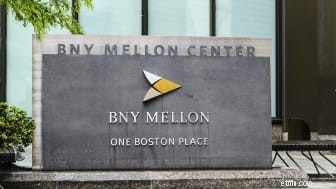
뉴욕 멜론 은행 (BK, $59.91) truly stands apart from the back.
Warren Buffett has been an admirer of BNY Mellon for some time, and despite his dwindling love for banks, he has largely left his BK stake alone. He did trim the position a little in Q2 2020, but that's nothing compared to the heavy-handed haircuts that Berkshire's other bank holdings have suffered over the past few quarters.
Bank of New York Mellon is a custodian bank that holds assets for institutional clients and provides back-end accounting services. Its roots actually go all the way back to 1784, when Bank of New York was founded by a group including Alexander Hamilton and Aaron Burr. Today, BK is the nation's ninth-largest bank by assets, according to data from the Federal Reserve.
Berkshire Hathaway first took a position in BK back during Q3 2010, when it paid an estimated average price of $43.90. Since then, Berkshire Hathaway has become the bank's largest investor at 8.4% of shares. (Vanguard is No. 2 at 8.0%.)

DaVita (DVA, $106.47) was a largely undisturbed holding in the Berkshire Hathaway equity portfolio, at least up until in 2020. Then Buffett snipped 1% of his stake in the kidney care provider and dialysis center operator in Q1 2020. He cut it by another 5% in Q3.
But Buffett has left the position alone in 2021.
DaVita serves patients via more than 3,000 dialysis centers in the U.S. and nine other countries. Aging baby boomers and a graying population in many developed markets should provide a strong, secular tailwind.
Berkshire disclosed its initial position in DaVita during 2012's first quarter. Given that DVA was a large position of Ted Weschler's Peninsula Capital in his pre-Berkshire days, it wasn't unreasonable to assume that it was his pick. Weschler confirmed as much in 2014.
DaVita's shares have been a disappointment, however. DVA has underperformed the S&P 500 by roughly 167 percentage points since Q1 2012, including a 9% loss in 2021.
For now, Buffett is DaVita's largest shareholder by a country mile. Its stake of 36.1 million shares represents a little more than a third of the company's shares outstanding. And DVA remains a top-10 holding in the Berkshire Hathaway equity portfolio.

U.S. 방코프 (USB, $60.46) is the nation's fifth-largest bank by assets and America's biggest regional bank. It'a also one of the oldest Buffett stocks in the Berkshire Hathaway portfolio; the Oracle of Omaha initiated his position in the first quarter of 2006.
Buffett is notoriously tight-lipped about U.S. Bancorp and, at least historically speaking, has rarely touched the position. But he clipped it by another 1% in Q3, or by 2.5 million shares, following trimmings of 0.6% and 1.1% in Q2 and Q1, respectively.
Scraping just a bit off the USB stake stands in stark contrast to what Buffett has done with so many of Berkshire's other bank stocks, however. Mostly, he's taken a hatchet to them. And it's not like the regional lender's returns have justified holding on when Buffett has abandoned so many of its peers.
True, USB's total return beats the broader market by 6.6 percentage points so far in 2021, but it lags considerably over the past three-, five-, 10- and 15-year periods.
U.S. Bancorp shareholders no doubt appreciate Berkshire's vote of confidence. The holding company's 8.5% stake makes it the largest institutional shareholder, ahead of Vanguard (7.3%) and BlackRock (6.3%).
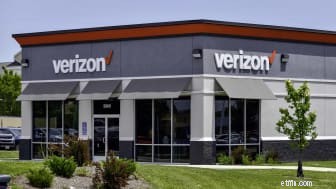
Verizon (VZ, $52.40), the only telecommunications company in the Dow Jones Industrial Average, is a beloved staple of long-term dividend investors everywhere. That's why it looks so at home in Berkshire Hathaway's portfolio.
And Buffett is warming to it.
Berkshire and Buffett initiated a brand-new stake in VZ in Q4 2020, picking up almost 146.7 million shares valued at $8.69 billion. In one fell swoop, the telco accounted for a sizable 3.2% of Berkshire's total equity portfolio value.
That position got a little bigger in Q1 2021, as Warren Buffett added more than 12 million shares, improving the stake by 8%. VZ's percentage of assets has slipped a bit, but still remains a hefty 2.9% weighting. Berkshire also remains the fourth-largest owner of VZ shares at 3.8%, behind institutional investors Vanguard (7.9%), BlackRock (7.0%) and State Street Global Advisors (4.0%).
Bulls like Verizon for both its growth prospects in the era of 5G networking, its defensive characteristics and the reliable income stream it delivers to investors.
"With a safe dividend yield and low leverage, we believe the market favors Verizon's 5G strategy and simpler story," say Raymond James equity research analysts. "Whether we are in an expansion or a contraction, consumers' internet and mobile plans may be the last thing they're willing to give up when times get tough."

Moody's (MCO, $390.78) is a business and financial services firm best known for its Moody's Investors Service credit rating arm – one of the three major American business credit ratings agencies alongside Standard &Poor's and Fitch Ratings. It also offers financial analysis technology via Moody's Analytics.
MCO is a longtime, significant holding in the Berkshire Hathaway portfolio – and an ironic one to boot.
"Uncle Warren" first dipped his toe in during the first quarter of 2001, and he has been content with his investment of late, leaving his 24.7 million-share stake unchanged over the past couple of years.
The funny thing about Berkshire's holding in Moody's is that Buffett said back in 2010 that "Our job is to rate credit ourselves. We do not outsource that to ratings agencies." Yet Berkshire Hathaway is the largest institutional holder of MCO, owning 13.2% of the financial firm. (Vanguard is a distant second at 7.2%.)
The holding is meaningful on Berkshire's end, too. At nearly 3% of assets, Moody's is one of the top 10 Buffett stocks.
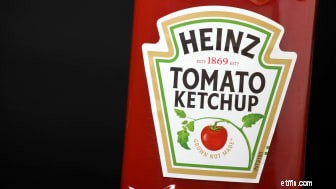
Warren Buffett was one of the driving forces behind the 2015 merger of packaged-food giant Kraft and ketchup purveyor Heinz to create Kraft Heinz (KHC, $37.62). It's Berkshire's fifth-largest stock investment with a market value of nearly $12 billion.
But it has been a dog, and Buffett likely still regrets his participation in what was one of his biggest deals of the past decade.
Berkshire Hathaway recorded a $3 billion non-cash loss from an impairment of intangible assets in 2018, "arising almost entirely from our equity interest in Kraft Heinz," Buffett wrote in his 2019 letter to shareholders. In early 2019, KHC wrote down the value of its brands by nearly $15 billion. In 2020, Fitch downgraded the company's debt to junk status. Its second-quarter earnings beat expectations, but Kraft still had to record yet another $2.9 billion in impairments.
Kraft's operational performance has at least improved since then, but its shares have gone back to lagging the broader market. KHC still has a lot of catching-up to do to shed its "dud" status in the Berkshire Hathaway equity portfolio.
"I was wrong (about KHC)," Buffett flatly admitted on CNBC in 2019. Buffett says he overpaid, and it's difficult to disagree. Even including dividends, Kraft's shares are still down more than 30% since Sept. 30, 2015.
Berkshire Hathaway remains the company's second-largest shareholder with a 26.6% stake. Private investment firm 3G Capital – who teamed up with Berkshire in 2013 to purchase H.J. Heinz – is tops at 44.3%.
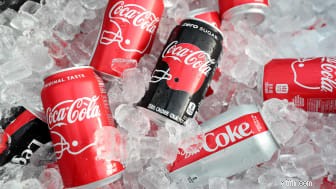
Buffett, an unabashed fan of Cherry Coke, started investing in Coca-Cola (KO, $56.62) stock soon after the stock market crash of 1987. In his 1988 letter to Berkshire shareholders, Buffett said he expected to hold on to the stock "for a long time."
Three decades later, he has proven true to his word. Berkshire is KO's largest shareholder with 9.3% of its shares outstanding, and Coca-Cola remains among the most iconic of Buffett stocks.
Coca-Cola made a brief appearance as a component of the Dow Jones Industrial Average in the 1930s. Shares were added back to the Dow in 1987, and they've remained a stalwart member ever since.
While Coca-Cola's stock performance hasn't impressed – its 128% total return over the past decade is well behind the S&P 500's 354% return – it has been an income investor's dream. The beverage maker has increased its dividend annually for 59 years.

American Express (AXP, $183.13) continues to endure as one of Warren Buffett's favorite investments.
Buffett likes to say this his preferred holding period is "forever," and AmEx is one of the premier examples. Berkshire entered its initial stake in the credit card company in 1963, when a struggling AmEx badly needed capital. Buffett obliged, getting favorable terms on his investment. He has played the role of white knight many times over the years, including during the 2008 financial crisis, as a means to get stakes in good companies at a discount. (Think:Goldman Sachs and Bank of America.)
No one would've been surprised if Buffett had trimmed his AXP position sometime during the course of 2020. After all, Berkshire dumped financial stocks all year, and he even trimmed his stakes in payments processors during Q2.
American Express is both . And yet the position remained fully intact across the year.
Berkshire Hathaway, which owns 19.1% of American Express' shares outstanding, is by far the company's largest shareholder. No. 2 BlackRock owns 6.0%.
Buffett praised the power of AmEx's brand at Berkshire's 2019 annual meeting. "It's a fantastic story, and I'm glad we own 18% of it," he said. Of course he's glad: A roughly 1,630% total return over the past quarter-century would make most investors glow.
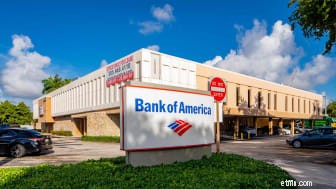
Buffett spent most of 2020 hacking and slashing at his various bank-stock holdings. But he remained as committed as ever to Bank of America (BAC, $47.05).
Buffett's interest in BAC dates back to 2011, when he swooped in to shore up the firm's finances in the wake of the Great Recession. In exchange for investing $5 billion in the firm, Berkshire received preferred stock yielding 6% and warrants giving Berkshire the right to purchase BofA common stock at a steep discount. (The Oracle of Omaha exercised those warrants in 2017, netting a $12 billion profit in the process.)
Warren Buffett let go of 2.2 million BAC shares in Q4 2019, but that represented a mere 0.2% reduction. And while he cut heavily into various bank holdings in 2020, he actually added to Berkshire's already large position in Q3 of that year by snapping up more than 85 million shares.
The stake in BAC, worth more than $41 billion, accounts for 14.6% of the holding company's total portfolio value. Meanwhile, Berkshire is Bank of America's largest shareholder, at 12.0% of its shares outstanding.

Warren Buffett absolutely adores Apple (AAPL, $150.00), but even he decided to take a little bite out of BRK.B's stake at the end of last year.
Berkshire Hathaway sold off 57.2 million shares, or 6% of its AAPL stake, during the final quarter of 2020. But that likely had little to do with a lack of faith in the iPhone maker.
Call it a hunch.
"I don’t think of Apple as a stock," Buffett has said about Apple. "I think of it as our third business."
It might as well be. Even after its Q4 share sales, the tech giant still represents more than 40% of assets in the Berkshire Hathaway equity portfolio. And Berkshire remains Apple's third largest investor with an 887 million-share stake representing about 5.4% of all shares outstanding. Only Vanguard and BlackRock – giants of the passively managed index fund universe – hold more Apple stock.
The Oracle of Omaha has only occasionally dabbled in technology stocks. But he bought Apple with two fists, and he's more than happy to discuss his ardor for AAPL. As he has said more than once on CNBC, he loves the power of Apple's brand and its ecosystem of products (such as the iPhone and iPad) and services (such as Apple Pay and iTunes).
"It's probably the best business I know in the world," Buffett said a year ago. "And that is a bigger commitment that we have in any business except insurance and the railroad."
It's likely that Buffett was merely taking profits on what has been an exceptionally fruitful investment. AAPL shares have returned 494% since the end of Q1 2016, when Berkshire initiated its stake. That's more than three times better than the broader market.